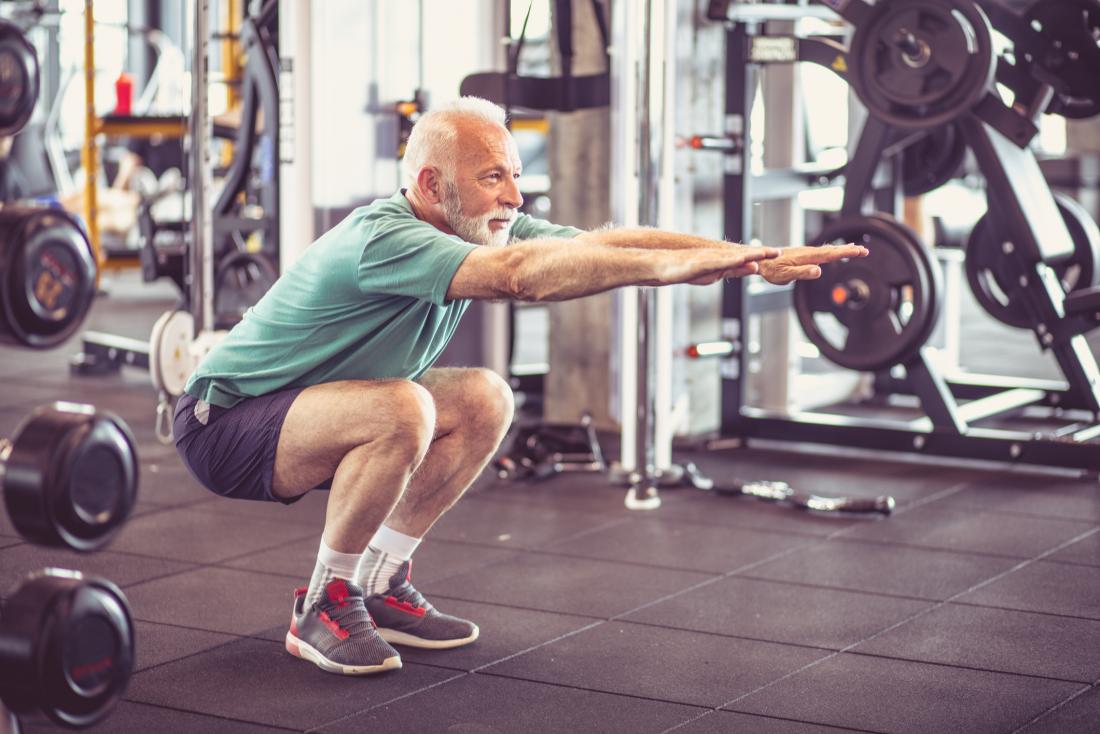
Increased muscle power can improve longevity, new research suggests.
Professor Claudio Gil Araújo, who is the director of research and education at Exercise Medicine Clinic — CLINIMEX in Rio de Janeiro, Brazil, led the new study.
Muscle power differs from muscle strength in that it relies on generating force and velocity while coordinating movement. For example, lifting a weight one time requires strength, but lifting it several times as quickly as possible requires power.
The study involved 3,878 nonathlete participants who were 41 to 85 years old. Each participant took a maximal muscle power test between 2001 and 2016 using an upright row exercise.
The researchers determined each participant’s maximal muscle power by taking the highest value that they achieved over two or three attempts with increasing weight and then calculating the power exertion per kilogram of body weight.
They then separated the participants into quartiles according to their maximal muscle power, with quartile one being low and quartile four being high. They also analyzed the participants separately based on their sex.
The team followed the participants for an average of 6.5 years after this initial measurement, during which time, 247 men and 75 women died. The researchers found that those who had maximal muscle power above the median for their sex had higher survival rates than those in the lower quartiles.
In fact, the participants in quartile one had a risk of dying that was 10 to 13 times higher than that of those in quartiles three and four, while the risk for those in quartile two was still four to five times higher.
Prof. Araújo explains that earlier studies examined the benefits of increasing muscle strength in relation to life expectancy, but notes that this study is the first to look specifically at muscle power.
“Rising from a chair in old age and kicking a ball depend more on muscle power than muscle strength, yet most weight-bearing exercise focuses on the latter,” he says.
“Our study shows for the first time that people with more muscle power tend to live longer.”
Prof. Claudio Gil Araújo
Prof. Araújo presented the study findings last week at the European Society of Cardiology’s EuroPrevent 2019 meeting in Lisbon, Portugal.
Habits that can help increase longevity
Many lifestyle changes can go a long way toward maximizing health and increasing longevity. A factor that has one of the most significant effects on someone’s health is their diet.
It is best to avoid foods that are high in saturated fat, for example, and people should not forget to load up on fiber. Foods to limit include those with added salt and many processed foods, particularly those that have a lot of simple carbohydrates, including sugar.
Physical activity is another important facet of good health. Experts recommend 30 minutes of moderate activity 5 days a week to help stave off chronic health issues, including cardiovascular disease or type 2 diabetes and even some types of cancer.
Reducing or eliminating tobacco products and alcohol consumption can also help lengthen life.
Now, perhaps experts could consider increasing muscle power as another way to better one’s health and increase longevity.
Ways to increase muscle power
Prof. Araújo outlines a few ways to increase muscle power. First, it is important to choose a weight that is neither easy to lift nor so immense that the person cannot lift it at all.
Focus on doing 1 to 3 sets of 6 to 8 repetitions each while moving the weight as quickly as possible. Slowly return the weight to its initial position each time, and rest between sets.
It is also crucial to choose exercises for both the upper and lower body and to choose different ones each time to avoid boredom and burnout. If a weight becomes too heavy or an exercise becomes too difficult, reduce the repetitions or weight to prevent injury.
Of course, it is best to consult with a doctor before embarking on any exercise routine, and it is essential to pay attention to how it feels. Too much pain is a red flag.
“Power training is carried out by finding the best combination of speed and weight being lifted or moved,” explains Prof. Araújo.
“For strength training at the gym, most people just think about the amount of weight being lifted and the number of repetitions without paying attention to the speed of execution.”
“But, for optimal power training results, you should go beyond typical strength training and add speed to your weight lifts.”
Prof. Claudio Gil Araújo
